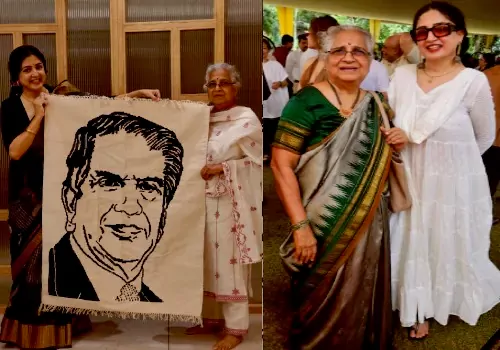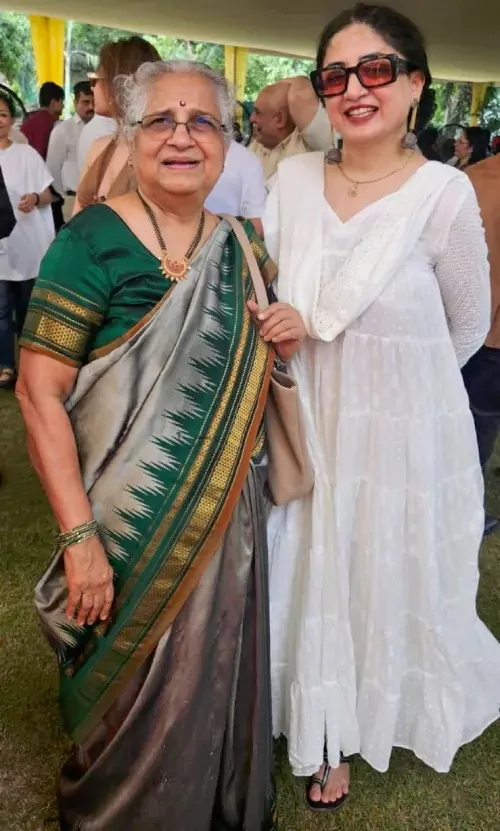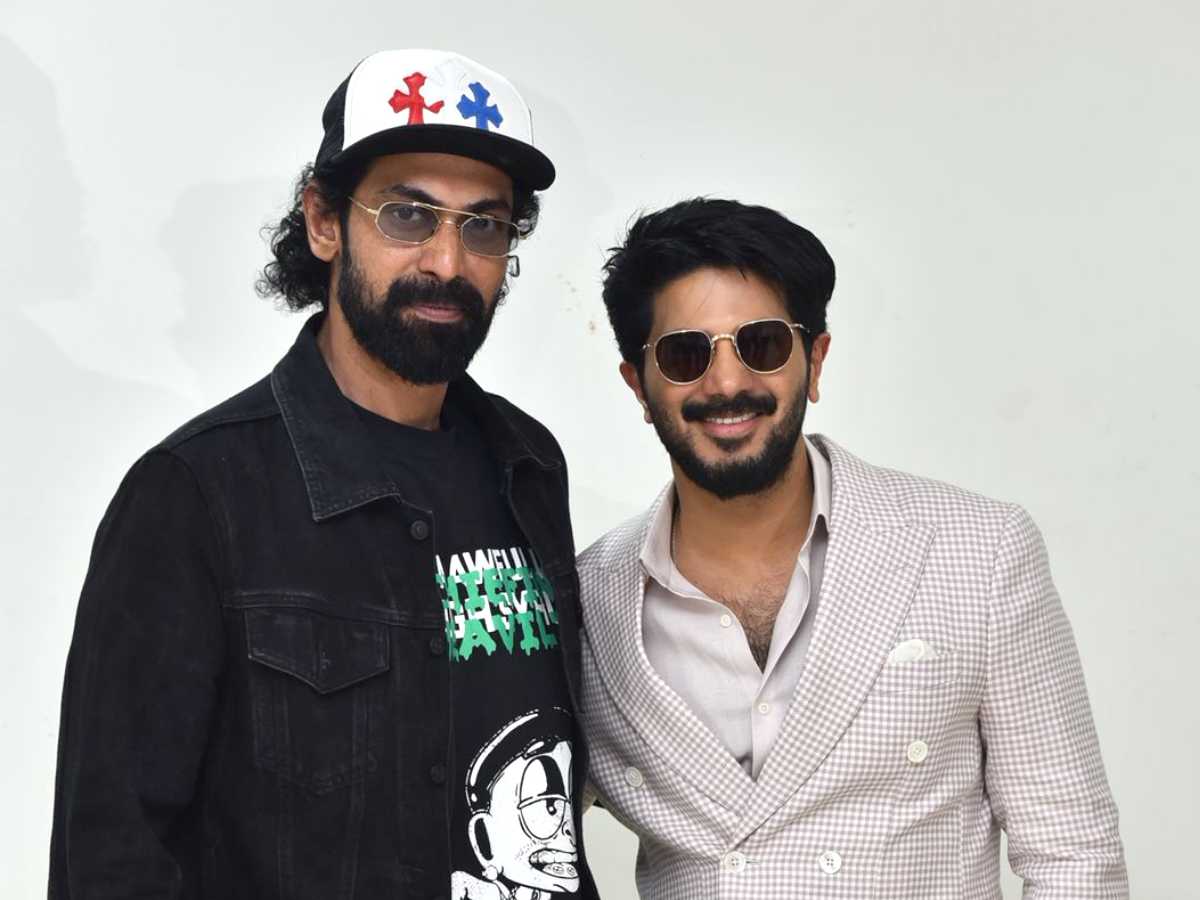
On August 7, 2025, as India celebrates National Handloom Day, Sudha Murty appeared at a special event in Bengaluru organized by handloom promoter and activist Poonam Kaur, wore a simple yet powerful handloom saree, embodying the spirit of woman power. In a touching moment, Poonam gifted Sudha a handwoven portrait of Ratan Tata, meticulously crafted by handloom artists. This gift was more than just a piece of art—it was a symbol of legacy, courage, and social good. Ratan Tata, who once sent Sudha photos of Jamsetji and JRD Tata, represents the Tata ethos of integrity and service.
Why did Sudha choose to wear a handloom saree on this occasion? Because it reflects her life’s philosophy: true empowerment lies in simplicity and purpose. Handlooms, often woven by women from marginalized communities, represent courage, creativity, and dignity—the very values Sudha holds dear. By wearing the saree, she honored the weavers, just as she has spent her life uplifting the forgotten. Her choice was a silent act of rebellion, a message that impact isn’t about extravagance but about intent.
In 1974, a young Sudha Kulkarni (now Infosys co-founder Sudha Murthy) pursuing master’s degree at the Indian Institute of Science (IISc) in Bengaluru, saw a job advertisement that would change her life. The ad from Tata Engineering and Locomotive Company (TELCO, now Tata Motors) had a specific condition: “Female candidates need not apply.” For Sudha, who had excelled in the male-dominated field of engineering, this wasn’t just an insult; it was a direct challenge to her dreams. Filled with indignation, she took a simple postcard and wrote a letter to JRD Tata, the chairman of the Tata Group. “You built my institution, IISc, yet you prevent women from being part of your legacy. Is this justice?” she questioned, her words filled with courageous dignity.
That postcard was the spark that ignited change. JRD Tata, a man who valued vision over tradition, invited Sudha for an interview. Her intelligence and courage made her the first woman engineer at TELCO. From 1974 to 1982, she worked in Pune, Mumbai, and Jamshedpur workshops. Her rebellion was more than just a personal victory; it dismantled TELCO’s discriminatory policy and opened doors for women across the Tata Group. Sudha’s bold stand sent a powerful message: one woman’s voice could challenge decades of discrimination.

This act of defiance was the foundation of Sudha Murty’s journey as a change-maker. Working under JRD Tata, she learned a lesson that would define her life. In 1982, when she left TELCO to support her husband, Narayana Murthy, in founding Infosys, JRD’s words were etched in her heart: “Success means giving back to society. Society gives us so much; we must give it back.” These words became her life’s guiding principle.
Sudha invested in knowledge, relationships, and social good. Her books, written with simple yet profound prose, have inspired millions, especially young women. The relationships she built on empathy and honesty have made her a mentor, a philanthropist, and a friend to many. Through the Infosys Foundation, which she established in 1996, she built schools, hospitals, and libraries, uplifting those forgotten by society. The photos of Jamsetji Tata and JRD Tata in her office, and the boardrooms named after them at Infosys, are a testament to her deep respect for the Tata legacy.
Poonam Kaur’s gift of the Ratan Tata portrait was fitting. Sudha’s connection to the Tatas—from her rebellion against TELCO’s policy in 1974 to her relationships with JRD and Ratan Tata—is a bond of shared commitment to social good. Both Sudha and Ratan Tata served on the PM CARES Fund, she as an advisor and he as a trustee. This handwoven portrait, made in the spirit of the handlooms Sudha champions, is a tribute to her journey from a courageous young engineer to a philanthropist who has changed millions of lives.
Sudha Murty’s rebellion against the Tata policy in 1974 wasn’t just for a job; it was a stand for every woman who was told she didn’t belong. Her investment in knowledge made her a storyteller and an inspiration. Her investment in relationships made her a compassionate leader. Her investment in social good made her a legend. On National Handloom Day, as she received the handwoven portrait of Ratan Tata, Sudha stood not just as the woman who rebelled, but as the weaver of dreams. Her choice of the handloom saree was perfect—not because it was beautiful, but because it was a symbol of empowerment, proving that a simple thread, woven with purpose, can change the world. Sudha Murty, the woman who once challenged the Tatas, now stands as a proud part of their legacy and a testament to the enduring spirit of India.

Poonam Kaur sharing her excitement wrote, “She revolted against the Tatas – rest is history!!! Had the honour of presenting a 100% woven portrait of our beloved businessman, Ratan Tata ji, to none other than Sudha Murthy ji, a woman who truly embodies the values he stood for. It all started when I had the privilege of showcasing Ratan Tata ji’s portrait to the very first employee of TELCO, who created history with grit, guts, and gratitude. What made it even more special was when I got a surprise call from Ratan Tata ji himself last year, and he smiled, thanked me, and said he’d see me soon. Little did I know he’d leave us before our meeting could happen.
When I heard about his passing, I was heartbroken, but I wanted his portrait to reach someone who shares similar values. I wrote to Sudha Murthy ji with zero expectations. To my surprise, I met her at a gathering, introduced myself as an activist for women and weavers, and she remembered my letter! Despite her packed schedule, she called me over, and I gifted her the 100% woven portrait of Ratan Tata ji on Handlooms Day.
She was a bit hesitant to take pictures as she was casually dressed, but I insisted it was for Handlooms Day and she graciously came out of her comfort zone to take some pictures with me. This Handlooms Day is truly special because it celebrates two legends in one frame – Ratan Tata ji and Sudha Murthy ji – embodying #Shakti and #Sanskriti. Women keep the culture alive!
Thank you, Sudha ji, for accepting this gift and blessing me. No one could value Ratan Tata ji’s portrait more than you. Happy Handlooms Day!!! #HandloomsDay #RatanTata #SudhaMurthy”






